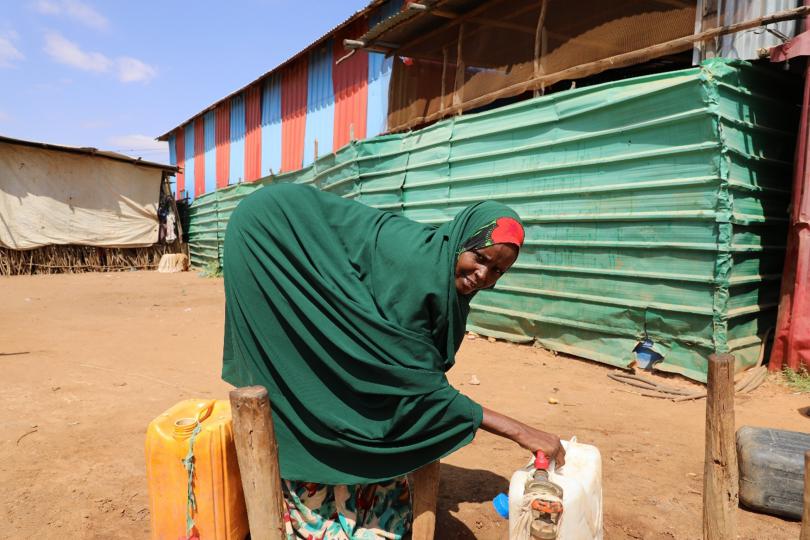Beyond the Floodwaters: Rebuilding Lives in Dollo Ado

Story summary
Fatuma* a mother of eight lives in Dollo Ado, of the Somali region with her children and her husband. Their sole source of income was her husband's work as a broker in the livestock market. When floods forced them to flee, they moved to a nearby government school, which served as a shelter for displaced people. The family stayed in the school for three months.
Dollo Ado, is among the areas within the Liban Zone, of the Somali region, that sustained severe impact from the flood. Fatuma's household belongings were swept away by the rushing water, and their residence and latrine were demolished by the flood.
The El Niño-induced floods during the October to December rain season have affected approximately 1.5 million people in the south and southeastern parts of Ethiopia, including Somali, South Ethiopia, Southwest Ethiopia, and Oromia regions.
Fatuma's story in her own words (Quotes)
My name is Fatuma, and I live in Dollo Ado with my husband and our eight children. My husband works as a broker in the livestock market, which is our family's sole source of income.
During the flood, we were in our house when it started. Initially, we hoped it would recede, but as the water level gradually rose to around our knees, we realized it was getting higher and higher. In a quick decision, we gathered our children and rode on a donkey to reach a nearby school for safety. We stayed there for three months until the floodwaters subsided.
Life was extremely challenging at the temporary shelter. We had no bedding to sleep on, insufficient clothing for the cold nights, and struggled to access clean water. The flood had swept away all our household belongings, leaving us with nothing.
Fortunately, Save the Children provided us with essential items such as blankets, jerricans, soap, mosquito nets, basins, and more. These supplies were crucial, especially since we had lost everything in the flood. They even provided us with cooking utensils, which were essential for preparing and consuming the food provided by the government while we stayed in the shelter. Additionally, I was able to support my relatives by sharing some of the items provided to me. Sharing these items helped us all cope better with the challenging circumstances.The flood had a significant impact on my family; we lost all our household belongings, and our house was destroyed. After three months of staying in the temporary shelter, we managed to carry out basic repairs and returned to our village. Now, we are back in our house and slowly rebuilding our lives.
After the flood, my husband's work in the livestock market as a broker was greatly affected. The livestock business experienced a significant decline, and as a result, my husband struggled to earn enough money to meet our daily needs. We are facing financial difficulties as a family due to this downturn in his business.
How Save the Children is helping
On November 4, 2023, the Somali Regional State Disaster Risk Management Bureau (DRMB) reported the grim aftermath of heavy rainfall and flooding, documenting extensive damage and mass displacement. The report unveiled a distressing toll: 24 woredas and 74 sites affected, 36,311 households impacted, 17,268 households displaced, 23 lives lost, 9,405 hectares of crops ravaged, and 3,636 livestock perished due to the El Niño-induced floods during the deyr/hageya (October to December) rain season.
Save the Children has been provided lifesaving integrated multi-sectoral approaches to address the existing identified gaps and priority needs of affected communities. The prepositioning of essential supplies such as life-saving WASH NFIs, and water treatment chemicals to address the pressing need for clean water amid the flood. This foresighted approach facilitated rapid distribution, ensuring that affected communities had access to safe drinking water during this critical time.
Background / Project information
SWAN is a consortium funded by EHF-OCHA that includes Save the Children (lead agency), World Vision, the Norwegian Refugee Council, and Action Against Hunger. SWAN RRM projects' overarching goals are to help save lives, alleviate suffering, and advance human dignity for those impacted by displacement, including host communities throughout Ethiopia.
SWAN consortium project has been providing lifesaving integrated multi-sectoral WASH, NFIS and Emergency Shelter, Protection and Health assistance and is delivering a flexible rapid humanitarian response mechanism to communities across Ethiopia affected by drought, flood conflict, disease outbreaks, and other humanitarian situations through effective rapid humanitarian support through in integrated multisectoral response in coordination with local partners, cluster coordination and actors.
The SWAN consortium is dedicated to addressing the challenges observed within the humanitarian supply pipeline system. They aim to achieve this by leveraging existing humanitarian platforms and focusing on flexible, faster, and proactive assessments and decision-making. The ultimate goal is to achieve faster procurement lead times, efficient delivery, and prepositioning of supplies such as medical equipment and kits, WASH, and Shelter NFIs. This will help address critical gaps by providing urgent and direct response to crises in a coordinated, timely, and principled manner through prepositioning resources. The SWAN consortium through its multi sectoral and rapid response reached 43,363 people (22,549 Children) in Dollo Ado town of Liban zone with distribution of NFIs, Supplies and replacement of old flood affected generators and pump for the town's water, energy office and health a center in responding to the most recent flooding in the area.





